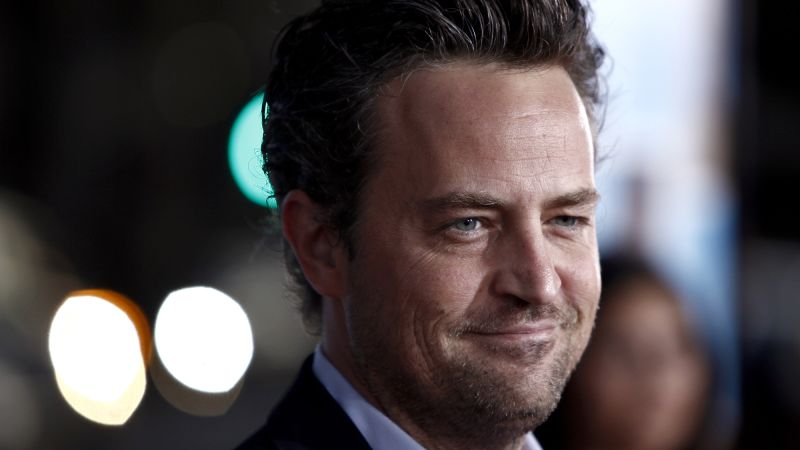Matthew Perry’s Death Raises Concerns over Ketamine Therapy Amid Unregulated Practices
In light of the recent death of actor Matthew Perry, whose passing was attributed by the Los Angeles County medical examiner’s office to “the acute effects of ketamine,” experts are reevaluating the use of this medication, which has gained traction as a treatment for depression and other mental health issues.
Perry was discovered face down in the hot tub at his residence, with the report listing drowning as a contributing factor. His tragic death has prompted questions regarding the application and potential misuse of ketamine in a largely uncontrolled landscape of medical clinics across the nation, a situation described by critics as reminiscent of the “Wild West.” Perry had openly discussed his struggles with drug addiction and had sought ketamine therapy as a treatment for his depression.
Anne Milgram, the Drug Enforcement Administration’s administrator, addressed the matter during a recent press conference, stating, “Matthew Perry sought treatment for depression and anxiety and went to a local clinic where he became addicted to intravenous ketamine. When clinic doctors refused to increase his dosage, he turned to unscrupulous doctors who saw Perry as a way to make quick money.”
Prosecutors have indicated that a network of illegal drug sellers, including two doctors, played a role in distributing the ketamine that resulted in Perry’s death. To date, five individuals have been charged in relation to the death of the "Friends" star. Of these, three are cooperating with the investigation, whereas two defendants have pleaded not guilty to an array of charges including conspiracy to distribute and falsifying medical records.
It’s essential to note that ketamine is solely approved by the U.S. Food and Drug Administration as an anesthetic, with no authorization for the treatment of psychiatric disorders. A related medication, esketamine, was sanctioned in 2019 for patients dealing with treatment-resistant depression.
Despite its controversial status, robust scientific evidence supports ketamine’s efficacy in treating individuals with severe depression and suicidal thoughts, dating back at least two decades. However, Perry’s death has intensified scrutiny surrounding the rapidly evolving and often misunderstood practice of ketamine therapy.
Dr. David Feifel, a psychiatrist and founder of the Kadima Neuropsychiatry Institute in San Diego, discussed ketamine’s distinct approach. “Ketamine is such a different type of treatment than traditional treatments, not just for depression, but in medicine in general,” he explained to CNN Chief Medical Correspondent Dr. Sanjay Gupta on the podcast Chasing Life. He stressed the importance of the treatment environment and the patient’s mental state during the administration for optimal results.
Feifel, who was among the first to use ketamine off-label for depression at UC San Diego’s Center for Advanced Treatment of Mood and Anxiety Disorders, detailed how ketamine targets glutamate—the brain’s predominant messenger—enhancing neuroplasticity and fostering new neural connections.
Initially developed as an anesthetic in the 1960s, ketamine’s dissociative and hallucinogenic effects have led to its illicit use as a recreational drug. Feifel noted, “Ketamine treatment is associated with an altered state of thinking, a psychedelic-like state of thinking, for a short period of time. There’s a substantial amount of evidence that that is part of the therapeutic effect."
He cautioned, however, that while such experiences may facilitate emotional breakthroughs for some, they can also be distressing and require careful management. "Proper preparation and supervision are essential," he emphasized.
The psychiatrist remarked on the overwhelming statistics surrounding mental illness, stating, "The statistics are just unbelievable in terms of rates of depression, anxiety, PTSD (post-traumatic stress disorder) and suicide — and they are not getting better."
Regarding ketamine therapy, Feifel advocates for rigorous standards, highlighting that it could be life-changing for individuals unresponsive to conventional treatments. He stressed, “It is highly effective when conventional (treatments) are not effective. And its rapid effectiveness against suicidal thoughts is really important.”
Moreover, when conducted under medical supervision, ketamine is considered safe, with Feifel claiming it’s “almost impossible to die from an overdose of ketamine alone.” However, he cautioned that Perry’s circumstances, which lacked medical oversight, should serve as a sobering reminder of the potential dangers associated with uncontrolled use.
Perry’s death underscores the necessity for patients to conduct thorough research before pursuing ketamine therapy. Feifel advised seeking treatment through reputable medical channels, particularly those led by mental health professionals, and emphasized the importance of psychotherapy as part of a comprehensive treatment plan.
Furthermore, recent changes during the pandemic allowing lenience in prescribing controlled substances have posed risks, particularly for those obtaining ketamine via telehealth. Feifel urged individuals to remain vigilant against the dangers of unsupervised use, cautioning, “I think it’s a recipe for disaster.”
As discussions around ketamine therapy evolve, Feifel remains hopeful that the public can differentiate between Perry’s unfortunate experience and the genuine therapeutic potential of the drug. "There are people who get addicted to drugs, even drugs that are relatively low on the addiction potential scale as ketamine is," he noted.
Listeners can access the full episode of Chasing Life for additional insights as new episodes will resume next week on Fridays.



